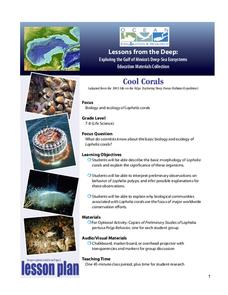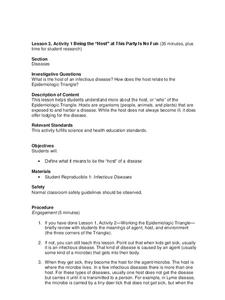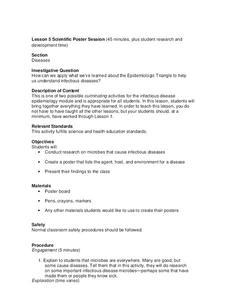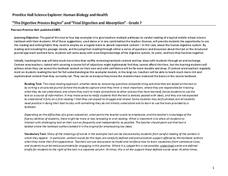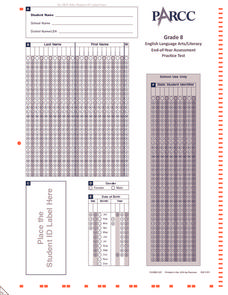University of Colorado
Rings and Things
Galileo first observed Saturn's rings in 1610. Through the use of a flashlight and baby powder, classes see how they can observe the rings of the outer planets from far away. Another demonstration shows how these rings, made of ice and...
University of Colorado
Space Travel Guide
Neptune takes 164.8 Earth years to travel around the sun. In the fifth of 22 lessons, young scientists create a travel guide to a planet in our solar system. They provide tips for others on what to bring, what they see, and their...
Messenger Education
Look But Don’t Touch—Exploration with Remote Sensing
Mars is home to the tallest mountain in our solar system, Olympus Mons. In this set of two activities, learners review geologic land formations through the analysis of aerial maps. They then apply this knowledge to aerial maps of objects...
NOAA
Biological Oceanographic Investigations – I, Robot, Can Do That!
How do you decide the best person for each job? Would it be easier if you didn't have to consider their feelings? The lesson begins with a discussion of underwater robots. Then groups research one of these robots and present their...
NOAA
Deep-Sea Ecosystems – Life is Weird!
A pool of brine in the deep sea can be up to four times as salty as the surrounding sea water. The deep sea ecosystem relies on chemosynthesis and the organisms that live there are often strange to us. The lesson plan focuses on...
NOAA
Deep-Sea Ecosystems – Entering the Twilight Zone
Imagine an ecosystem without any light or oxygen, where living things convert carbon dioxide into food. This ecosystem is thriving and might just be the largest ecosystem on our planet, yet we know very little about it. The instructional...
NASA
States of Matter
Water, one of the basic needs of humans, is found in all three states of matter on Earth; no other planet—that we know of—possesses this quality. Here is a unit that allows learners to explore through experimentation what it takes to...
NOAA
Importance of Deep-Sea Ecosystems – Chemists with No Backbones
Marine invertebrates offer us many new options for developing pharmaceutical drugs, such as w-conotoxin MVIIA, which is extracted from the cone snail and is a potent painkiller. The lesson encourages scholars to research various types of...
NOAA
Deep-Sea Ecosystems – Cool Corals
Young oceanographers research deep sea corals that thrive on chemosynthesis. The lesson focuses on the biology of the animal, preferred habitat, associations, and interactions.
NASA
Introduction to Astronomy
Welcome to your new job as an astrophysicist, astrobiologist, engineer, or research scientist at NASA. Your job is to search for alien life in our solar system! Throughout a unit of activities, learners search the galaxy through...
Columbus City Schools
Photosynthesis and Respiration
Thirty percent of the world's oxygen is produced by rainforests found throughout the world. Seventh grade learners explore the processes of photosynthesis and respiration through 10 days of labs, manipulatives, and discussions. They...
Centers for Disease Control and Prevention
Learning about Giardia and Giardiasis - Research and Role Play
Young biologists begin researching giardia and completing an epidemiologic triangle. They then portray either a parent of a sick child or a physician in a fun role play activity.
Centers for Disease Control and Prevention
Being the “Host” at This Party is No Fun
Discuss the symptoms and variations from infectious diseases from one person to the next. After a class discussion, small groups complete research on the topic.
Centers for Disease Control and Prevention
Scientific Poster Session
An informative instructional activity offers young scientists the chance to research a microbe and create an epidemiologic triangle for a poster session and presentation.
Savvas Learning
"The Digestive Process Begins" and "Final Digestion and Absorption"
Want your class to digest text more thoroughly? Middle schoolers learn about the digestive system in the lesson and reinforce informational text reading skills through a variety of strategies. They engage in a close reading approach,...
Curated OER
Unit 2: Global to Local: Understanding My Place in the Hydrosphere
What does the ground around your home have to do with water pollution? Young ecologists learn about their local watershed and create their own cause-and-effect models of the hydrosphere.
Curated OER
Unit 1: Water is Life: The Heart and Science Behind this Phrase
Water, water, everywhere — but will there be enough to drink? Check out these detailed lesson plans to meet NGSS water cycle and CCSS literacy standards in your science classroom. Learners do a close reading of a challenging, poetic text...
NASA
Cosmic Times 2019
NASA is planning a journey to Mars, and current scholars could very well be a part of a future mission. During the unit, pupils research the advances in space exploration and knowledge about the universe. Then they work in groups to...
Curated OER
Unit 3: Scientific Writing
Write-on! Demonstrate a writing model and support learners as they write an informational essay on a water resource issue of your (or their) choosing. The lesson plan provides a well-scaffolded summative writing experience that wraps up...
University of Georgia
Land Biomes Project
Challenge scholars to research a biome and create a presentation for the producers of Survivor to choose their ecosystem for the next season's show. The materials include outlines, worksheets, and grading rubrics for individuals as well...
PHET
Learning about Space Weather
Is the sun the only celestial body with magnetic fields? A guided discussion on the weather in space is designed with a mix of questions, discussions, explanations, and applications. Additionally, the resouce includes an article for...
Class Antics
Leap Year
What is a Leap Year and why do we have it? Find out with this Leap Day/Leap Year response to reading learning exercise in which scholars read a short passage and use their new-found knowledge to answer five questions with short answers.
Curated OER
Ecosystems
A critical look into the structure and function of ecosystems is here for young learners as a series of lessons and worksheet activities. Topics covered include land-based and marine ecosystems, connections to the water cycle, food webs,...
Curated OER
End-of-Year Practice Test (Grade 8 ELA/Literacy)
Common Core testing on your mind? Ease your class into the test by requiring pupils to take this practice test. The focus of this test is reading. Learners read several passages, both literary and informational, and respond to multiple...










